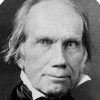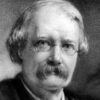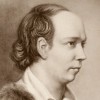You’re either part of the solution or part of the problem.
Leroy Eldridge Cleaver (1935-1998) American activist
Speech (1968)
The great mistake most people make is the assumption that most people are sane. I know very few people who are sane — and only one man in my life who was really grown up. All the other people are terribly recognizable as kids who have learned grown-up ways of behaving.
If a man, holding a belief which he was taught in childhood or persuaded of afterwards, keeps down and pushes away any doubts which arise about it in his mind, purposely avoids the reading of books and the company of men that call in question and discuss it, and regards as impious those questions which cannot easily be asked without disturbing it — the life of that man is one long sin against mankind.
William Kingdon Clifford (1845-1879) English mathematician and philosopher
“The Ethics of Belief,” Part 1 “The Duty of Inquiry,” Contemporary Review (Jan 1877)
(Source)
There is nothing wrong with America that cannot be cured with what is right in America.
William Jefferson "Bill" Clinton (b. 1946) American politician, US President (1993-2001)
First Inaugural Address (20 Jan. 1993)
The last time I checked, the Constitution said, “of the people, by the people and for the people.” That’s what the Declaration of Independence says.
We must believe in luck. For how else can we explain the success of those we don’t like?
Moralism is historically one of America’s great defects. Moralism is intolerant of ambiguity; it perceives reality in extreme terms of good and evil and regards more sophisticated judgments as soft and unworthy. The temptation to moralize is strong; it is emotionally satisfying to have enemies rather than problems, to seek out culprits rather than flaws in the system. God knows it is emotionally satisfying to be righteous with that righteousness that nourishes itself on the blood of sinners. But God also knows that what is emotionally satisfying can be spiritually devastating.
Clearly it is not Scripture that creates hostility to homosexuality, but rather hostility to homosexuality that prompts certain Christians to retain a few passages from an otherwise discarded law code. The problem is not how to reconcile homosexuality with scriptural passages, but rather how to reconcile the rejection and punishment of homosexuals with the love of Christ.
William Sloane Coffin, Jr. (1924-2006) American minister, social activist
The Courage to Love, ch. 5 (1982)
(Source)
Tolerance implies a respect for another person, not because he is wrong or even because he is right, but because he is human.
John Cogley (1916-1976) American religion journalist, editor
Commonweal, column
You don’t drown by falling in the water; you drown by staying there.
Edwin L. Cole (1922-2002) American minister and writer
(Attributed)
quoted in Don
He prayeth well, who loveth well
Both man and bird and beast.
He prayeth best, who loveth best
All things both great and small;
For the dear God who loveth us,
He made and loveth all.
The abuse of a thing is no argument against the use of it.
Jeremy Collier (1650-1726) English clergyman
Immorality of the English Stage (1704)
I don’t know where my songs come from
Judy Collins (b. 1939) American folk singer, film maker
Interview in Empire:ZINE, by T. Fennel Crenshaw (1998)
Friendship, of itself a holy tie,
Is made more sacred by adversity.John Dryden (1631-1700) English poet, dramatist, critic
The Hind and the Panther, Part 3, l. 47 (1687)
(Source)
The actual lines read:
For friendship of it self, an holy tye,
Is made more sacred by adversity.
Life often presents us with a choice of evils, rather than of goods.
Charles Caleb "C. C." Colton (1780-1832) English cleric, writer, aphorist
Lacon: Or, Many Things in Few Words, Vol. 2, § 102 (1822)
(Source)
Men will wrangle for religion; write for it; fight for it; die for it; anything but — live for it.
Charles Caleb "C. C." Colton (1780-1832) English cleric, writer, aphorist
Lacon: Or, Many Things in Few Words, Vol. 1, § 25 (1820)
(Source)
It is always safe to learn, even from our enemies, seldom safe to venture to instruct, even our friends.
Charles Caleb "C. C." Colton (1780-1832) English cleric, writer, aphorist
Lacon: Or, Many Things in Few Words, Vol. 1, § 286 (1820)
(Source)
Evils in the journey of life are like the hills which alarm travelers on their road. Both appear great at a distance, but when we approach them we find they are far less insurmountable than we had conceived.
Charles Caleb "C. C." Colton (1780-1832) English cleric, writer, aphorist
Lacon: Or, Many Things in Few Words, Vol. 2, § 241 (1822)
(Source)
It is only when the rich are sick that they fully feel the impotence of wealth.
Charles Caleb "C. C." Colton (1780-1832) English cleric, writer, aphorist
Lacon: Or, Many Things in Few Words, Vol. 1, § 538 (1820)
(Source)
To know a man, observe how he wins his object, rather than how he loses it; for when we fail, our pride supports us; when we succeed, it betrays us.
Charles Caleb "C. C." Colton (1780-1832) English cleric, writer, aphorist
Lacon: Or, Many Things in Few Words, Vol. 1, § 265 (1820)
(Source)
Applause is the spur of noble minds, the end and aim of weak ones.
Charles Caleb "C. C." Colton (1780-1832) English cleric, writer, aphorist
Lacon: Or, Many Things in Few Words, Vol. 1, § 424 (1820)
(Source)
Examinations are formidable even to the best prepared, for the greatest fool may ask more than the wisest man can answer.
Charles Caleb "C. C." Colton (1780-1832) English cleric, writer, aphorist
Lacon: Or, Many Things in Few Words, Vol. 1, § 322 (1820)
(Source)
What I call a great minister is one who employs the Way in serving his sovereign. If he cannot do that, he resigns.
[所謂大臣者、以道事君、不可則止。]
Confucius (c. 551- c. 479 BC) Chinese philosopher, sage, politician [孔夫子 (Kǒng Fūzǐ, K'ung Fu-tzu, K'ung Fu Tse), 孔子 (Kǒngzǐ, Chungni), 孔丘 (Kǒng Qiū, K'ung Ch'iu)]
The Analects [論語, 论语, Lúnyǔ], Book 11, verse 24, sec. 3 (11.24.3) (6th C. BC – AD 3rd C.) [tr. Hinton (1998)]
(Source)
Numbered 11.23 by Legge and other early translators, as noted. More recent translators use 11.24, though some use 11.22. All are noted below.
(Source (Chinese)). Alternate translations:
What is called a great minister is one who serves his prince according to what is right; and when he finds he cannot do so, retires.
[tr. Legge (1861), 11.23]
Those whom we call 'great ministers' are such as serve their prince conscientiously, and who, when they cannot do so, retire.
[tr. Jennings (1895), 11.23]
Men I call statesmen are those who will serve their master according to their sense of duty; who, however, when they find they cannot do that, consistently, with their sense of duty, will resign.
[tr. Ku Hung-Ming (1898)]
He who may be called a great minister is one who serves his Prince according to the right, and when that cannot be, resigns.
[tr. Soothill (1910) 11.23]
You call a man a great minister when be serves his prince honestly. and retires when he cannot.
[tr. Pound (1933), 11.23]
What I call a great minister is one who will only serve is prince while he can do so without infringement of the Way, and as soon as this is impossible, resigns.
[tr. Waley (1938), 11.23]
The so-called great minister serves his prince in keeping with The Right Way, and if that is impossible, he quits his post.
[tr. Ware (1950), 11.22]
The term "great minister" refers to those who serve their lord according to the Way and who, when this is no longer possible, relinquish office.
[tr. Lau (1979), 11.24]
What I call a great minister serves his ruler in accordance with the Way, and when it is impossible to do so he resigns.
[tr. Dawson (1993), 11.22]
A great minister is a minister who serves his lord by following the Way, and who resigns as soon as the two are no longer reconcilable.
[tr. Leys (1997), 11.24]
Those who are called great ministers use the Way to serve the sovereign. If thye cannot, they should then stop.
[tr. Huang (1997), 11.22]
The persons named as the Great Officials, should service the Lords with the benevolent way, and stop if the way does not work.
[tr. Cai/Yu (1998), #284, 11.24]
What are called great ministers are those who serve their lord with the way [dao], and when they cannot, resign.
[tr. Ames/Rosemont (1998), 11.24]
Those whom one calls great ministers serve their ruler according to the Way, and when they can no longer, they stop.
[tr. Brooks/Brooks (1998), 11:22]
What we call "great ministers" are those who seek to serve their lord by means of the Way, and who resign if unable to do so.
[tr. Slingerland (2003), 11.24]
The term “great minister” applies to someone who serves the ruler according to the Way. If he cannot do that, he retires.
[tr. Watson (2007), 11.24]
The term "great ministers" applies to those who serve their lord in a moral way. If they simply cannot, then they stop.
[tr. Chin (2014), 11.24]
To see the right and not do it is cowardice.
[見義不爲、無勇也。]
Confucius (c. 551- c. 479 BC) Chinese philosopher, sage, politician [孔夫子 (Kǒng Fūzǐ, K'ung Fu-tzu, K'ung Fu Tse), 孔子 (Kǒngzǐ, Chungni), 孔丘 (Kǒng Qiū, K'ung Ch'iu)]
The Analects [論語, 论语, Lúnyǔ], Book 2, verse 24 (2.24.2) (6th C. BC – AD 3rd C.) [tr. Soothill (1910)]
(Source)
(Source (Chinese)). Alternate translations:
To see what is right and not to do it is want of courage.
[tr. Legge (1861)]
It is (moral) cowardice to leave undone what one perceives to be right to do.
[tr. Jennings (1895)]
To see what is right and to act against one's judgment shows a want of courage.
[tr. Ku Hung-Ming (1898)]
To see justice and not act upon it is cowardice.
[tr. Pound (1933)]
To see what is right and not do it is cowardice.
[tr. Waley (1938)]
It is cowardice to fail to do what is right.
[tr. Ware (1950)]
Faced with what is right, to leave it undone shows a lack of courage.
[tr. Lau (1979)]
To see what is right and not to do it is cowardice.
[tr. Dawson (1993)]
To not act when justice commands, that is cowardice.
[tr. Leys (1997)]
To see something you ought to do and not to do it is want of courage.
[tr. Huang (1997)]
To see something you ought to do and not to do it is want of courage.
[tr. Huang (1997)]
One does not do the righteous things when one sees them, it is not brave.
[tr. Cai/Yu (1998), #40]
Failing to act on what is seen as appropriate [yi] is a want of courage.
[tr. Ames/Rosemont (1998)]
If he sees what is right but does not do it, he lacks courage.
[tr. Brooks/Brooks (1998)]
And to recognize a Duty without carrying it out is mere cowardice.
[tr. Hinton (1998)]
To see what is right, but to fail to do it, is to be lacking in courage.
[tr. Slingerland (2003)]
To see what is right and not do it is cowardly.
[tr. Watson (2007)]
Faced with what is right yet doing nothing about it shows a lack of courage.
[tr. Chin (2014)]
Being aloof from a righteous obligation is cowardice.
[tr. Li (2020)]
Choose a job you love, and you will never have to work a day in your life.
Confucius (c. 551- c. 479 BC) Chinese philosopher, sage, politician [孔夫子 (Kǒng Fūzǐ, K'ung Fu-tzu, K'ung Fu Tse), 孔子 (Kǒngzǐ, Chungni), 孔丘 (Kǒng Qiū, K'ung Ch'iu)]
(Spurious)
When you see someone who is worthy, concentrate upon becoming their equal; when you see someone who is unworthy, use this as an opportunity to look within yourself.
[見賢思齊焉、見不賢而內自省也。]
Confucius (c. 551- c. 479 BC) Chinese philosopher, sage, politician [孔夫子 (Kǒng Fūzǐ, K'ung Fu-tzu, K'ung Fu Tse), 孔子 (Kǒngzǐ, Chungni), 孔丘 (Kǒng Qiū, K'ung Ch'iu)]
The Analects [論語, 论语, Lúnyǔ], Book 4, verse 17 (4.17) (6th C. BC – AD 3rd C.) [tr. Slingerland (2003)]
(Source)
(Source (Chinese)). Alternate translations:
When we see men of worth, we should think of equaling them; when we see men of a contrary character, we should turn inwards and examine ourselves.
[tr. Legge (1861)]
When you meet with men of worth, think how you may attain to their level; when you see others of an opposite character, examine yourself.
[tr. Jennings (1895)]
When we meet with men of worth, we should think how we may equal them. When we meet with worthless men, we should turn into ourselves and find out if we do not resemble them.
[tr. Ku Hung-Ming (1898)]
When you see a man of worth, think how to rise to his level. When you see an unworthy man, then look within and examine yourself.
[tr. Soothill (1910)]
See solid talent and think of measuring up to it; see the un-solid and examine your own insides.
[tr. Pound (1933)]
In the presence of a good man, think all the time how you may learn to equal him. In the presence of a bad man, turn your gaze within!
[tr. Waley (1938)]
When you see a man of the highest caliber, give thought to attaining his stature. When you see one who is not, go home and conduct a self-examination.
[tr. Ware (1950)]
When you meet someone better than yourself, turn your thoughts to becoming his equal. When you meet someone not as good as you are, look within and examine your own self.
[tr. Lau (1979)]
When you come across a superior person, think of being equal to him. When you come across an inferior person, turn inwards and examine yourself.
[tr. Dawson (1993)]
When you see a worthy man, seek to emulate him. When you see an unworthy man, examine yourself.
[tr. Leys (1997)]
On seeing a worthy man, think of equalling him; on seeing an unworthy man, examine yourself inwardly.
[tr. Huang (1997)]
One should think to follow the sagaciousness when one sees it; One should examine onceself when one sees the no sagaciousness.
[tr. Cai/Yu (1998), #83]
When you meet persons of exceptional character think to stand shoulder to shoulder with them; meeting persons of little character, look inward and examine yourself.
[tr. Ames/Rosemont (1998)]
When he sees a worthy man, let him think how he might come up to him; when he sees an unworthy man, let him examine within himself.
[tr. Brooks/Brooks (1998)]
In the presence of sages, you can see how to perfect your thoughts. In the presence of folls, you must awaken yourself.
[tr. Hinton (1998)]
When you see a worthy person, think about how you can equal him. When you see an unworthy person, reflect on your own conduct.
[tr. Watson (2007)]
When you meet a worthy person, think how you could become his equal. When you meet an unworthy person, turn inward and examine your own conduct.
[tr. Chin (2014)]
When you meet a virtuous person, you should strive to emulate his virtues. When you meet a person void of virtue, you should consider whether you have the same flaws.
[tr. Li (2020)]
I have no use for the strictures of You must. You must not.
[無可無不可]
Confucius (c. 551- c. 479 BC) Chinese philosopher, sage, politician [孔夫子 (Kǒng Fūzǐ, K'ung Fu-tzu, K'ung Fu Tse), 孔子 (Kǒngzǐ, Chungni), 孔丘 (Kǒng Qiū, K'ung Ch'iu)]
The Analects [論語, 论语, Lúnyǔ], Book 18, verse 8 (18.8.5) (6th C. BC) [ed. Lao-Tse, tr. Hinton (1998)]
(Source)
(Source (Chinese)). Alternate translations:
I have no course for which I am predetermined, and no course against which I am predetermined.
[tr. Legge (1861)]
I will take no liberties, I will have no curtailing of my liberty.
[tr. Jennings (1895); in the footnote he gives a more raw translation, "Without possibilities (or freedom to act) -- without impossibilities"]
With me there is no inflexible "thou shalt" or 'thou shalt not."
[tr. Soothill (1910)]
I have no categoric can and cannot.
[tr. Pound (1933)]
I have no "thou shalt" or "thou shalt not."
[tr. Waley (1938)]
I accept life as it comes. [tr. Ware (1950)]I have no preconceptions about the permissible and the impermissible.
[tr. Lau (1979)]
I avoid saying what should or should not be done.
[tr. Dawson (1993)]
I follow no rigid prescriptions on what should, or should not, be done.
[tr. Leys (1997)]
I have neither favorable nor unfavorable situation. [tr. Huang (1997)]I have not any stubborn positiveness or negation.
[tr. Cai/Yu (1998)]
I do not have presuppositions as to what may and may not be done.
[tr. Ames/Rosemont (1998)]
I have no "may" and no "may not."
[tr. Brooks/Brooks (1998)]
I have no preconceptions about what one can or cannot do.
[tr. Annping Chin (2014)]
This may be the source of Lin-Yutang, ed. The Wisdom of Confucius (1938):
The superior man goes through his life without any one preconceived course of action or any taboo. He merely decides for the moment what is the right thing to do.
Speaking of Yen Hui, the Master said: “How sad — to watch him forge ahead so resolutely, and never see how far he could go.”
[子謂顏淵曰、惜乎、吾見其進也、未見其止也。]
Confucius (c. 551- c. 479 BC) Chinese philosopher, sage, politician [孔夫子 (Kǒng Fūzǐ, K'ung Fu-tzu, K'ung Fu Tse), 孔子 (Kǒngzǐ, Chungni), 孔丘 (Kǒng Qiū, K'ung Ch'iu)]
The Analects [論語, 论语, Lúnyǔ], Book 9, verse 21 (9.21) (6th C. BC – AD 3rd C.) [tr. Hinton (1998)]
(Source)
Regarding his finest student, who died young. Probable origin of a phrase frequently attributed to Confucius: "It does not matter how slowly you go so long as you do not stop."
Earlier sources use Legge's numbering of 9.20, as noted. (Source (Chinese)). Alternate translations:
The Master said of Yen Yuan, "Alas! I saw his constant advance. I never saw him stop in his progress."
[tr. Legge (1861), 9.20]
"Alas for Hwúi! I saw him (ever) making progress. I never saw him stopping short."
[tr. Jennings (1895), 9.20]
Confucius remarked of the same disciple [Yen Hui]: "Alas! he is dead. I have observed his constant advance; I never saw him stop in his progress."
[tr. Ku Hung-Ming (1898), 9.20]
The Master, referring to Yen Yüan, said: "Alas! I ever saw him make progress, and never saw him stand still."
[tr. Soothill (1910), 9.20]
He described Yen Yuan: Alas, I see him advance, I never see him stop (take a position).
[tr. Pound (1933), 9.20]
The Master said of Yen Hui, Alas, I saw him go forward, but had no chance to see whither this progress would have led him in the end.
[tr. Waley (1938), 9.20]
What a pity that Yen Hui is gone! I saw him make progress, but I never found out what his limit was.
[tr. Ware (1950)]
Alas! I only saw him advance and never saw him stop.
[tr. Huang (1997)]
The Master said of Yen Yūan, "I watched him making progress, but I did not see him realize his capacity to the full. What a pity!"
[tr. Lau (1979)]
The master said of Yan Hui: "Alas! I saw that he was making progress, but I never saw that he was stopping."
[tr. Dawson (1993)]
The Master said of Yan Hui: "Alas, I watched his progress, but did not see him reach the goal."
[tr. Leys (1997)]
The master, speaking of Yan Yuan, said: "Alas! I only saw him advance and never saw him stop."
[tr. Huang (1997)]
Confucius talked about Yuan Yan, said: "What regrettable it is! I just saw that he kept going ahead, and never saw that he got any stopping."
[tr. Cai/Yu (1998), #230]
The Master said about Yan Hui, "Such a pity! I only saw his progress; I never saw where he got to."
[tr. Ames/Rosemont (1998)]
The Master said of Yén Hwéi, Alas! I saw him start, but I did not see him finish.
[tr. Brooks/Brooks (1998)]
The Master said of Yan Hui, “Alas! I watched his advance, and never once saw him stop.”
[tr. Slingerland (2003)]
Speaking of Yan Yuan, the Master said, What a pity! I saw him move forward. I never saw him come to a stop.
[tr. Watson (2007)]
The Master, referring to Yan Hui, said, "It is a pity! I saw him moving forward but did not see him complete his journey."
[tr. Chin (2014)]
Confucius said of Yan Yuan, "Impressive indeed! I always see his progress and have never noticed his pause."
[tr. Li (2020)]
To be born enlightened: that is highest. To study and so become enlightened: that is next. To feel trapped and so study: that is third. To feel trapped and never study: that is the level of the common people, the lowest level.
[孔子曰、生而知之者、上也、學而知之者、次也、 困而學之、又其次也、困而不學、民斯爲下矣。]
Confucius (c. 551- c. 479 BC) Chinese philosopher, sage, politician [孔夫子 (Kǒng Fūzǐ, K'ung Fu-tzu, K'ung Fu Tse), 孔子 (Kǒngzǐ, Chungni), 孔丘 (Kǒng Qiū, K'ung Ch'iu)]
The Analects [論語, 论语, Lúnyǔ], Book 16, verse 9 (16.9) (6th C. BC – AD 3rd C.) [tr. Hinton (1998)]
(Source)
Brooks says this was interpolated into Book 16 at the time of Book 18. (Source (Chinese)). Alternate translations:
Those who are born with the possession of knowledge are the highest class of men. Those who learn, and so, readily, get possession of knowledge, are the next. Those who are dull and stupid, and yet compass the learning, are another class next to these. As to those who are dull and stupid and yet do not learn; -- they are the lowest of the people
[tr. Legge (1861), sec. 2]
They whose knowledge comes by birth are of all men the first (in understanding); they to whom it comes by study are next; men of poor intellectual capacity, who yet study, may be added as a yet inferior class; and lowest of all are they who are poor in intellect and never learn.
[tr. Jennings (1895)]
The highest class of men are those who are born with a natural understanding. The next class are those who acquire understanding by study and application. There are others again who are born naturally dull, but who yet by strenuous efforts, try to acquire understanding: such men may be considered the next class. Those who are born naturally dull and yet will not take the trouble to acquire understanding: such men are the lowest class of the people.
[tr. Ku Hung-Ming (1898)]
Those who have innate wisdom take the biggest rank. Those who acquire it by study rank next. Those who learn despite natural limitations come next. But those who are of limited ability and yet will not learn, -- these form the lowest class of men.
[tr. Soothill (1910)]
Those who know instinctively (as at birth) are the highest; those who study and find out, come next; those who are hampered and study come next. Those who are boxed in and do not study constitute the lowest people.
[tr. Pound (1933)]
Best are those who are born wise. Next are those who become wise by learning. After come those who have to toil painfully in order acquire learning. Finally, to the lowest class of the common people belong those who toil painfully without ever managing to learn.
[tr. Waley (1938)]
Those born with an understanding of the universe belong to the highest type of humanity. Those who understand it as the result of study come second. Those who study it with great difficulty come third. Because, owing to the difficulty, they do not study, the people come last.
[tr. Ware (1950)]
Those who are born with knowledge are the highest. Next come those who attain knowledge through stud. Next again come those who turn to study after having been vexed by difficulties. The common people, in so far as they make no effort to study even after having been vexed by difficulties, are the lowest.
[tr. Lau (1979)]
Those who know things from birth come first; those who know things from study come next; those who study things although the find them difficult come next to them; and those who do not study because they find things difficult, that is to say the common people, come last.
[tr. Dawson (1993)]
Those who have innate knowledge are the highest. Next come those who acquire knowledge through learning. Next again come those who learn through the trials of life. Lowest are the common people who go through the trials of life without learning anything.
[tr. Leys (1997)]
Those who know it at birth belong to the highest category; those who know it through learning belong to the second category; those hwo learn it when baffled belong to the third category; those who do not learn even when baffled -- such people belong to the lowest category.
[tr. Huang (1997)]
It is the first class that one gets the knowledge because of one's innateness, it is the second class that one gets the knowledge because of one's studying, it is the third class that one gets studying because of one's encountering the difficulty, and it is under the class that one who does not study even if one encounters difficulties.
[tr. Cai/Yu (1998), #435]
Knowledge (zhi 知) acquired through a natural propensity for it is its highest level; knowledge acquired through study is the next highest; something learned in response to difficulties encountered is again the next highest. But those among the common people who do not learn even when vexed with difficulties -- they are at the bottom of the heap.
[tr. Ames/Rosemont (1998)]
Those who know from birth are the highest, those who know it from study are next, those who despite difficulties study it are next after that. Those who in difficulties do not study: these are the lowest.
[tr. Brooks/Brooks (1998)]
Those who are born understanding it are the best; those who come to understand it through learning are second. Those who find it difficult to understand and yet persist in their studies come next. People who find it difficult to understand but do not even try to learn are the worst of all.
[tr. Slingerland (2003)]
Those born with understanding rank highest. Those who study and gain understanding come next. Those who face difficulties and yet study—they are next. Those who face difficulties but never study—they are the lowest type of people.
[tr. Watson (2007)]
Those who are born with knowledge are at the top. Next are those who acquire knowledge through learning. Behind them are those who have difficulties [absorbing knowledge] but are still determined to learn. And at the bottom are people who have difficulties [absorbing knowledge] and do not even attempt to learn.
[tr. Chin (2014)]
This appears to be the source of the following aphorism frequently attributed to Confucius, and recorded in James Wood, ed., Dictionary of Quotations (1893):
By three methods we may learn wisdom: First, by reflection, which is noblest; Second, by imitation, which is easiest; and third by experience, which is the bitterest.
For more discussion of that Wood "translation":
Our greatest glory is, not in never falling, but in rising every time we fall.
Oliver Goldsmith (1730-1774) Irish poet, playwright, novelist
The Citizen of the World: or, Letters from a Chinese Philosopher, Residing in London, to His Friends in the East, Letter 7 (1762)
(Source)
Ostensibly from a Chinese visitor to London, Lien Chi Altangi, the letters were written by Goldsmith and published in The Public Ledger in 1760-61. Letter 22 has the similar "True magnanimity consists not in NEVER falling, but in RISING every time we fall."
The saying is often attributed to Confucius (Letter 7's introduction implied that they were), but is not found in Confucius' work. The saying is also sometimes attributed to Ralph Waldo Emerson. See here for more discussion.
To let a sudden fit of anger make you forget the dangers you risk for yourself and for those who are nearest and dearest to you — is this not clouded judgment?
[A. 一朝之忿、忘其身以及其親、非惑與。]
[B. 一朝之忿忘其身以及其亲非惑与]
Confucius (c. 551- c. 479 BC) Chinese philosopher, sage, politician [孔夫子 (Kǒng Fūzǐ, K'ung Fu-tzu, K'ung Fu Tse), 孔子 (Kǒngzǐ, Chungni), 孔丘 (Kǒng Qiū, K'ung Ch'iu)]
The Analects [論語, 论语, Lúnyǔ], Book 12, verse 21 (12.21) (6th C. BC – AD 3rd C.) [tr. Chin (2014)]
(Source)
Waley suggests the internal rhymes in both the questions in 12.21 and this particular answer mean they are quotations from an outside source, a "didactic poem," and thus carry additional meaning now lost.
(Source (Chinese) A, B). Alternate translations:
For a morning's anger to disregard one's own life, and involve that of his parents; -- is not this a case of delusion?
[tr. Legge (1861)]
And as to illusions, is not one morning's fit of anger, causing a man to forget himself, and even involving the consequences those who are near and dear to him -- is not that an illusion?
[tr. Jennings (1895)]
If a man allows himself to lose his temper and forget himself of a morning, in such a way as to become careless for the safety of is own person and for the safety of his parents and friends: -- is that not a case of a great delusion in life?
[tr. Ku Hung-Ming (1898)]
For a morning's anger to forget his own safety and involve that of his relatives, is not this irrational?
[tr. Soothill (1910)]
For one morning’s temper to jeopard one's life and even that of one's relatives, isn’t that hallucination?
[tr. Pound (1933)]
Because of a morning's blind rage to forget one's own safety and even endanger one's kith and kin, is that not a case of divided mind?
[tr. Waley (1938)]
In a moment’s burst of anger to forget oneself and one’s family. Wouldn’t this be utter confusion?
[tr. Ware (1950)]
To let a sudden fit of anger make you forget the safety of your own person or even that of your parents, is that not misguided judgment?
[tr. Lau (1979)]
To be oblivious of one's own person and even of one's own parents all because of a morning's anger -- is this not a confusion?
[tr. Dawson (1993)]
To endanger oneself and one's kin in a sudden fit of anger: is this not an instance of incoherence?
[tr. Leys (1997)]
In a fit of rage, you forget yourself and even your parents -- is that not delusion?
[tr. Huang (1997)]
If one has any anger so that one forgets one's pro0per behavior to take the anger upon the relatives, is not one confused?
[tr. Cai/Yu (1998), #307]
In a moment of rage to forget not only one's own person but even one's parents -- is this not being in a quandary?
[tr. Ames/Rosemont (1998)]
For the anger of a morning, to forget one's self and even one's kin, is that not a contradiction?
[tr. Brooks/Brooks (1998)]
To endanger yourself and your family, all in a morning's blind rage -- is that not delusion?
[tr. Hinton (1998)]
To forget yourself in a moment of anger and thereby bring ruin upon both you and your family -- is this not an example of confusion?
[tr. Slingerland (2003)]
Because of one morning's anger, to forget your own safety and even endanger those close to you -- this is faulty thinking, isn't it?
[tr. Watson (2007)]
If you act out of animus with the consequence of hurting yourelf and yoru loved ones, is that an example of delusion?
[tr. Li (2020)]
A common paraphrase of this is "When anger rises, think of the consequences." This is attributed to Confucius in Kang-Hi (K'ang-hsi, Kangxi) The Sacred Edict, Maxim #16 (1670, 1724) [tr. Milne (1817)]. An alternate translation is "In anger, think of the trouble" [tr. Baller (1892), ch. 16, sec. 15]
When Tzŭ Kung asked about the practice of virtue the Master replied: “A workman who wants to do his work well must first sharpen his tools. In whatever State you dwell, take service with the worthiest of its ministers, and make friends of the most Virtuous of its scholars.”
[子貢問爲仁。子曰、工欲善其事、必先利其器、居是邦也、事其大夫之賢者、友其士之仁者。]
Confucius (c. 551- c. 479 BC) Chinese philosopher, sage, politician [孔夫子 (Kǒng Fūzǐ, K'ung Fu-tzu, K'ung Fu Tse), 孔子 (Kǒngzǐ, Chungni), 孔丘 (Kǒng Qiū, K'ung Ch'iu)]
The Analects [論語, 论语, Lúnyǔ], Book 15, verse 10 (15.10) (6th C. BC – AD 3rd C.) [tr. Soothill (1910), 15.9]
(Source)
Originally numbered 15.9 by Legge, current translations identify it as 15.10. (Source (Chinese)). Alternate translations:
Tsze-kung asked about the practice of virtue. The Master said, "The mechanic, who wishes to do his work well, must first sharpen his tools. When you are living in any state, take service with the most worthy among its great officers, and make friends of the most virtuous among its scholars."
[tr. Legge (1861), 15.9]
T'sz-kung asked how to become philanthropic. The Master answered him thus: "A workman who wants to do his work well must first sharpen his tools. In whatever land you live, serve under some wise and good man among those in high office, and make friends with the more humane of its men of education."
[tr. Jennings (1895), 15.9]
A disciple of Confucius enquired how to live a moral life. Confucius answered, "A workman who wants to perfect his work first sharpens his tools. When you are living in a country, you should serve those nobles and ministers in that country who are men of moral worth, and you should cultivate the friendship of the gentlemen of that country who are men of moral worth."
[tr. Ku Hung-Ming (1898), 15.9]
Tze-kung asked about this business of manhood. He said: The craftsman wanting to perfect his craft must first put an edge on his tools (take advantage of implements already there, the containers). Living in a country, take service with the big men who have solid merit, make friends with the humane scholar-officers.
[tr. Pound (1933), 15.9]
Tzu-kung asked how to become Good. The Master said, A craftsman, if he means to do good work, must first sharpen his tools. In whatever state you dwell:
Take service with such of its officers as are worthy,
Make friends with such of its knights as are Good.
[tr. Waley (1938), 15.9]
When the workman wishes to do a better job, he must first sharpen his tools. So, in your case, no matter what state you inhabit, serve only the grand gentlemen of highest caliber, make friends only with those gentlemen who are manhood at its best.
[tr. Ware (1950)]
Tzu-kung asked about the practice of benevolence. The Master said, "A craftsman who wishes to practice his craft well must first sharpen his tools. You should, therefore, seek the patronage of the most distinguished Counsellors and make friend with the most benevolent Gentlemen in the state where you happen to be staying."
[tr. Lau (1979)]
Zigong asked about practising humaneness. The Master said: "If he wishes to make his work good, the craftsman must first sharpen his tools. If one is staying in a particular state, one serves the people of highest quality among its grandees and makes friends with the most humane among its public servants."
[tr. Dawson (1993)]
Zigong asked how to practice humanity. The Master said: "A craftsman who wishes to do good work must first sharpen his tools. In whatever country you settle, offer your services to the most virtuous ministers, and befriend those gentlemen who cultivate humanity."
[tr. Leys (1997)]
When Zi-gong asked how to cultivate humanity, the Master said: "If an artisan wishes to perfect his craft, he must first sharpen his tools. Living in this state, serve the worthy of its ministers and befriend the humane of its shi."
[tr. Huang (1997)]
Zigong asked how to practice the benevolence, Confucius said: "A worker wants to finish his job perfectly, must sharpen his tool first. One lives in this state, should service the sagacious persons in the senior officials, should make friends with the benevolent persons in the intellectuals.
[tr. Cai/Yu (1998)]
Zigong inquired about authoritative conduct (ren). The Master replied, "Tradesmen wanting to be good at (shan) their trade must first sharpen their tools. While dwelling in this state, then, we should serve those ministers who are of the highest character (xian), and befriend those scholar-apprentices (shi) who are most authoritative in their conduct.
[tr. Ames/Rosemont (1998)]
Dž-gùng asked about being ren. The Master said, If an artisan wants to do his job well, he must first sharpen his tools. When dwelling in some country, serve the worthy among its dignitaries; befriend the ren among its officers.
[tr. Brooks/Brooks (1998)]
Adept Kung asked about the practice of Humanity, and the Master said: “If a craftsman wants to do good work, he must first sharpen his tools. If you want to settle in a country, you must cultivate its wise ministers and befriend its Humane officials.”
[tr. Hinton (1998)]
Zigong asked about becoming Good. The Master said, “Any craftsman who wishes to do his job well must first sharpen his tools. In the same way, when living in a given state, one must serve those ministers who are worthy and befriend those scholar-officials who are Good.”
[tr. Slingerland (2003)]
Zigong asked how to practice humaneness. The Master said, A craftsman who wants to do his job well must first sharpen his tools. Whatever country you are in, be of service to the high officials who are worthy and become friends with the men of station who are humane.
[tr. Watson (2007)]
Zigong asked about the practice of humaneness. The Master said, "Artisans who wish to excel at their craft must sharpen their tools. When you live in any given state, you should serve the worthiest among the counselors and befriend the most human among the educated professionals."
[tr. Chin (2014)]
Zi Gong asked about Ren virtue. Confucius said, "When a craftsman [technician] wants to do a good job, he must sharpen his tools beforehand. After you have arrived in that country, serve and align yourself with competent and virtuous officials working for the prime minister and befriend colleagues hwo have the Ren virtue.
[tr. Li (2020)]
A frequent English paraphrase, attributed to Confucius but without citation to a particular analect, can be found as early as 1831:
The expectations of life depend upon diligence; the mechanic that would perfect his work must first sharpen his tools.
It is only the very wisest and the very stupidest who never change.
[唯上知與下愚不移]
Confucius (c. 551- c. 479 BC) Chinese philosopher, sage, politician [孔夫子 (Kǒng Fūzǐ, K'ung Fu-tzu, K'ung Fu Tse), 孔子 (Kǒngzǐ, Chungni), 孔丘 (Kǒng Qiū, K'ung Ch'iu)]
The Analects [論語, 论语, Lúnyǔ], Book 17, verse 3 (17.3) (6th C. BC – 3rd C. AD) [tr. Soothill (1910)]
(Source)
Some scholars recommend reading 17.2-3 together (I don't get it), and some actually merge them into a single verse; that is noted below. (Source (Chinese)). Alternate translations:
There are only the wise of the highest class, and the stupid of the lowest class, who cannot be changed.
[tr. Legge (1861)]
Only the supremely wise and the most deeply ignorant do not alter.
[tr. Jennings (1895)]
It is only men of the highest understanding and men of the grossest dullness, who do not change.
[tr. Ku Hung-Ming (1898)]
There are two classes that never change: the supremely wise and the profoundly stupid.
[Source (1906)]
Only the wisest and the dullest never change.
[tr. Soothill (1910), Alternate 1]
Only the uppermost wise and the lowermost stupid do not change.
[tr. Soothill (1910), Alternate 2]
Only those of highest intelligence, and lowest simplicity do not shift.
[tr. Pound (1933)]
It is only the very wisest and the very stupidest who cannot change.
[tr. Waley (1938)]
Only the highest and the lowest characters don’t change.
[tr. Lin Yutang (1938)]
The only ones who do not change are sages and idiots.
[tr. Ware (1950), 17.2]
It is only the most intelligent and the most stupid who are not susceptible to change.
[tr. Lau (1979)]
Only the most intelligent and the most stupid do not change.
[tr. Dawson (1993), 17.2]
Only the wisest and the stupidest never change.
[tr. Leys (1997)]
Only the highest of the wise and the lowest of the stupid do not change.
[tr. Huang (1997), 17.2]
Only the super wisdom and the infer stupidness cannot be changed.
[tr. Cai/Yu (1998), #443]
Only the most wise (zhi) and the most stupid do not move.
[tr. Ames/Rosemont (1998)]
It is the highest wisdom and the lowest stupidity that do not change.
[tr. Brooks/Brooks (1998), 17.2b]
Those of the loftiest wisdom and those of the basest ignorance: they alone never change.
[tr. Hinton (1998)]
Only the highest among the wise and the lowest among the stupid never change.
[tr. Watson (2007)]
Only the most intelligent and the most stupid are not inclined to change.
[tr. Annping Chin (2014)]
Only superior wisdom and extreme stupidity cannot be changed.
[tr. Li (2020)]
Only the supremely wise and the most deeply ignorant do not alter.
[Source]
Only the supremely wise and the abysmally ignorant do not change.
















